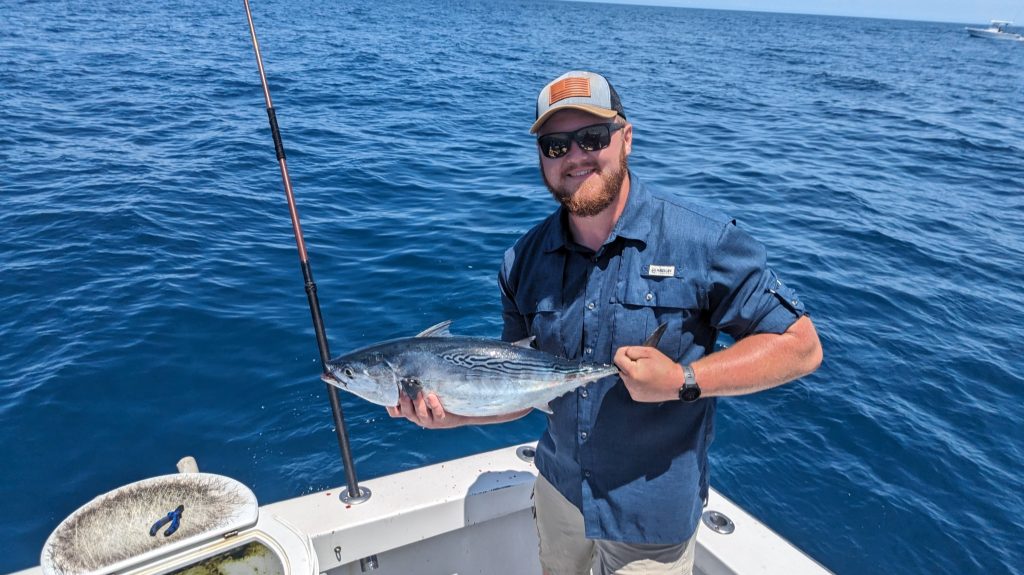-
Cardiovascular
Casting once again: Patient recovers from thoracic outlet syndrome and rediscovers thrill of being on the water

When Justin Pomeroy, 23, struggled after a weight training session, he wasn’t sure if he was simply fatigued or experiencing a medical crisis. While lifting weights, one of his shoulders popped, followed by radiating pain.
Despite being fit for his active job as a Florida-based U.S. Coast Guard crewman, he continued to feel debilitating weakness, even when making the slightest of movements.
His condition worsened over the next few days to the point that he went to the emergency department, where he learned he had numerous blood clots. Justin later came to learn that his struggle after weight training was an early warning sign of thoracic outlet syndrome, also known as TOS.
Seeking answers
Justin saw a physician who ran tests that indicated a blood clotting disorder. It was quickly identified that he had a predisposition to clotting due to a genetic blood mutation.
"At the time, I wasn't aware of how serious the situation was," Justin says. "Honestly, the whole time while in the hospital, I was more concerned about what work I was missing."
The discovery of blood clots, which were treated with anticoagulant medication, was just the beginning of Justin's ordeal. The Coast Guardsman who had been in excellent health would spend the next 18 months trying to discover why he had grown so weak that he couldn’t perform his job without stopping to rest.
"My arm had swollen to such a size that it had become unmanageable," Justin says. "I was in aviation, and it created a situation where I was grounded and not flying anymore."
More testing and bloodwork revealed that, in addition to the clotting disorder, Justin had TOS, a rare disorder that involves compression of the nerves, arteries or veins in the lower neck and upper chest.
"I was medically retired from the Coast Guard," Justin says. "It was devastating because that was my career path, and it was something I really wanted to do."
A 'nagging feeling'
Although disappointed to leave a job he loved, Justin didn’t stop looking for answers.
"I'm the type of person who likes to leave no stone left unturned, and I had this nagging feeling that more could be done to improve my situation," he says.
His search for answers led him to Mayo Clinic in Florida, wanting to see a team familiar with TOS diagnoses. Diagnosing thoracic outlet syndrome is complex because symptoms vary greatly and often can be indicators of other health problems — making it a difficult condition to pin down. Because there are multiple types of TOS, forming the correct diagnosis is key to successful treatment.
Justin got in to see Justin Yarbrough, nurse practitioner, and Dr. Sam Farres, chief of the Vascular Surgery Division. Justin says as he told them his story, the care team listened closely, asking questions and sharing information. "There was just a wealth of knowledge," says Justin. "I thought, they're going to help me find some answers."
The Mayo team ran tests and imaging studies that other facilities didn't do, Justin says, revealing he actually had two types of thoracic outlet syndrome — neurogenic and vascular. After trying conservative treatment approaches with mixed success, Justin and his care team made the decision together to schedule him for a rib resection surgery in September 2023.
"They didn't want to rush in and push me to have surgery," he says. "They really wanted to make sure we were doing the right thing for my specific situation."
He was amazed to find that shortly after surgery, he could be active again. But it wasn't just the outcome of his surgery that impressed him. Justin was overwhelmed by the care team's proficiency and level of attention throughout his journey.
"It was mind-blowing to show up to a medical appointment and they are already in the room waiting for you," he says. "They tried to get a very nuanced understanding of my condition, and if I asked a question, it was answered."
Today, Justin says he's pain-free and has greater mobility, allowing him to get back to activities he loves, like fishing on the open water.
"That's great news for me," he says, "but not-so-great news for the fish."







